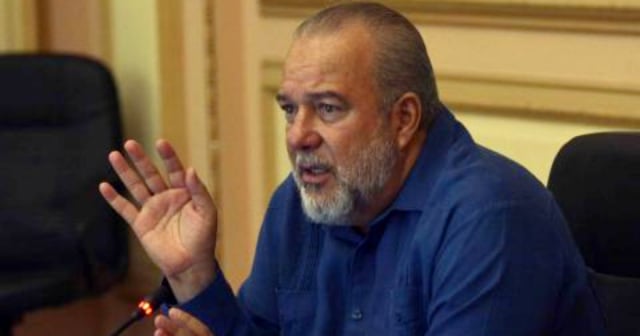The Cuban Prime Minister, Manuel Marrero Cruz, appeared on Thursday night in a troubled appearance on Cuban radio and television alongside executives from the Ministry of Energy and Mines to report on the current energy crisis in the country.
Marrero Cruz made it clear that the situation is extremely critical, and indicated that no short-term solution is expected.
"There are three important factors that contribute to the electricity generation deficit: the state of the infrastructure, the lack of fuel, and the increase in demand," he acknowledged, although he emphasized that the lack of fuel is the most significant of the three.
The senior official said that as a policy they have chosen to prioritize the residential sector and that they have been "paralyzing economic activities" to ensure energy generation for the population, an effort that, on the other hand, is not visible considering the 1,678 MW of blackouts that were scheduled for this same Thursday.
The prime minister stated that in a context of marked fuel scarcity like the current one, "the absence of gas for cooking has led to an increase in electricity demand" and has further complicated the situation.
Solutions?
Alfredo López, general director of the Electric Union (UNE), reported that in the case of fuel shortages, starting this Friday, the situation should improve with the unloading of a ship carrying fuel oil that will be delivered to the plants, and additionally, he will place another 2,000 tons of diesel to the engines.
However, in the medium and long term, according to Marrero, the solution to the recurring energy crisis in Cuba involves "eliminating dependence on fossil fuels, replacing it with clean energy"; while he noted that around 900 MW of contribution is expected in 2025 from that photovoltaic and renewable energy.
He added that he will not "limit the population that improves the quality of life," although he noted that an increase in electricity rates for the private sector is expected.
"We have been analyzing that non-state management forms have grown, paying subsidized rates without control," he pointed out, although he did not provide further details on the subject.
Another highlight of the night was the announcement that the Felton and Guiteras thermoelectric plants, two of the most important units in the system, will have to undergo a technical maintenance shutdown in the short term "to restore the design capacity of both plants," although no dates were provided in advance.
Alfredo López also indicated that thermal generation is performing within the parameters for the period and that the difficulties are concentrated in distributed and mobile generation. The latter have been affected by fuel problems, with shortages reaching about 800 MW on Thursday.
Both officials admitted that the current problems could last for more than two years due to the current deterioration of the thermal power plants, the fuel shortage, and the economic crisis that the nation is immersed in.
As usual, they have called on citizens to adopt energy-saving measures and consider the use of alternative energies and solar panels.
In a message posted on social media shortly before 4 p.m., ruler Miguel Díaz-Canel published on X that he had instructed Marrero Cruz and other cabinet members to hold a special appearance to address the “energy emergency situation that the country is going through.”
"The complex scenario we are going through is primarily due to the intensification of the economic war and financial and energy persecution by the United States, which complicates the importation of fuel and other necessary resources for that industry," wrote the leader.
The appearance of Manuel Marrero Cruz and the executives of the Ministry of Energy and Mines was scheduled for 8:30 p.m., but it was delayed due to supposed "connection problems with Santiago de Cuba," the province where the prime minister was located.
"It will be broadcast only once the technological difficulties are resolved and will be rebroadcast on Revista Buenos Días on Friday, at 8 a.m. and after the conclusion of the Noticiero del Mediodía, at 2 p.m.," reported the evening edition of the Noticiero Nacional de Televisión (NTV).
The situation of the National Electric System (SEN) has been showing signs of general collapse for several days, with prolonged power outages lasting up to 15 hours in some areas of the island.
The prolonged blackouts hitting the country with increasing severity sparked protests on Tuesday in the city of Sancti Spíritus and in Báguanos, Holguín.
What do you think?
SEE COMMENTS (1)Filed under:
